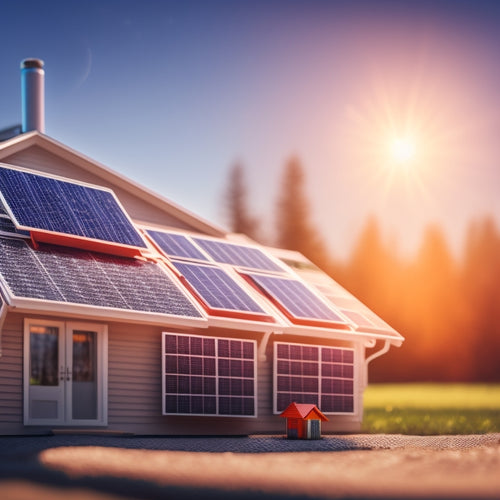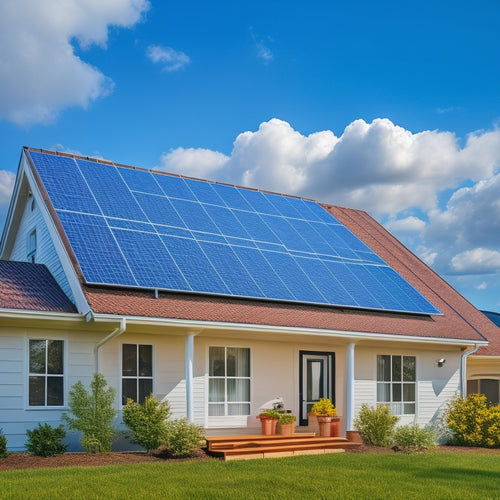
Choosing the Right Solar Charging System for Your Boat
Share
When choosing the right solar charging system for your boat, start by evaluating your energy consumption to determine the necessary solar panel size and type. Consider the available space, angle, and weight of the panels. You'll also need to analyze battery compatibility, selecting between lithium and lead-acid types based on your performance needs. Keep in mind the long-term cost savings and low maintenance associated with solar systems compared to traditional generators. Finally, ensuring reliable energy independence will enhance your boating experience. For a deeper understanding of system subtleties, your next steps will be essential.
At a Glance
- Assess your boat's energy consumption to determine the appropriate solar panel size and capacity needed for your needs.
- Choose solar panels based on available space, required wattage, and installation angle for optimal energy efficiency.
- Select compatible batteries, considering options like lithium for faster charging and lead-acid for cost-effectiveness, based on your energy management requirements.
- Factor in long-term savings from reduced fuel reliance and maintenance costs when evaluating the financial viability of a solar charging system.
- Ensure durability and minimal maintenance by selecting high-quality components that withstand marine environments and require regular cleaning and inspections.
Efficiency in Energy Use
To maximize your solar charging system's efficiency, start by evaluating your boat's energy consumption.
Understanding how much energy you use will guide you in selecting the best solar panel size and type for your needs.
Consider the benefits of off-grid power solutions, as they provide energy independence from traditional sources and allow for sustainable energy generation off-grid systems.
This strategic approach guarantees you utilize the most energy possible while minimizing waste.
Energy Consumption Assessment
Evaluating energy consumption is vital for maximizing efficiency when selecting a solar charging system for your boat. Start by conducting a thorough load assessment to identify your energy sources and their usage patterns over time. Understanding your energy profiles allows you to create accurate consumption forecasts, ensuring you're aware of your daily power needs.
Next, consider solar integration as a renewable option that fits your lifestyle. By aligning your energy requirements with efficiency benchmarks, you can determine the ideal capacity for your solar system.
Employ consumption metrics to analyze how much energy your appliances and devices draw, which will help you in power management strategies.
As you assess your energy consumption, keep in mind the importance of balancing your load with the solar charging capabilities. This balance is vital for ensuring you have enough stored energy for those times when sunlight isn't readily available.
Ultimately, a well-rounded energy consumption assessment will enable you to choose a solar charging system that not only meets your current needs but also allows for freedom and flexibility on your boating excursions. Adopt renewable options and make informed choices.
Optimal Solar Panel Selection
Selecting the right solar panels is essential for maximizing energy efficiency on your boat. The efficiency of your system largely hinges on two factors: panel size and installation angle. Choose panels that fit your available space while providing adequate wattage. Larger panels often yield more power, but they must be balanced with the area you have and the weight they add to your vessel.
To truly optimize your solar setup, consider the installation angle. Angling your panels towards the sun can considerably enhance energy capture throughout the day. Here's a quick reference table to help you visualize the impact of different panel sizes and angles:
| Panel Size | Installation Angle (degrees) |
|---|---|
| 100W | 30 |
| 200W | 45 |
| 300W | 60 |
Cost Savings Over Time
Investing in a solar charging system can lead to significant long-term savings on your boat's energy costs.
By reducing reliance on traditional fuel sources, you'll notice lower operational expenses over time. Additionally, adopting solar power reduces your carbon footprint, making it a clean and sustainable choice for energy generation, which is essential for environmental sustainability.
Additionally, consider the maintenance costs associated with solar systems, as they often require less upkeep than conventional generators.
Long-term Savings Potential
While many boaters initially focus on the upfront costs of solar charging systems, the long-term savings potential can greatly outweigh these initial investments.
By conducting a thorough investment analysis, you'll see that solar systems can considerably reduce or even eliminate your reliance on fuel-based generators and shore power.
Over time, the savings on fuel and maintenance costs can add up, providing you with a more predictable budget for your boating excursions.
Additionally, various financial incentives, such as tax credits and rebates, can further enhance the cost-effectiveness of your solar system.
These incentives often make it easier to recoup the initial investment, allowing you to enjoy the freedom of sustainable energy without breaking the bank.
As you adopt solar power, consider how much you'll save over the lifespan of your system, typically ranging from 20 to 30 years.
When you factor in lower operational costs and the potential increase in your boat's resale value, it becomes clear that the long-term benefits of solar charging systems can provide substantial financial relief and enhance your overall boating experience.
Maintenance Cost Considerations
As you consider the long-term financial benefits of solar charging systems, maintenance costs play a considerable role in your overall savings. One of the most attractive aspects of solar technology is its low maintenance requirements. Unlike traditional generators, which depend on fuel and regular servicing, solar panels typically boast a lifespan of 25 years or more, showcasing impressive solar panel longevity.
This durability translates to minimal upkeep, allowing you to focus more on enjoying your time on the water rather than worrying about maintenance.
Installation expenses may initially seem steep, but they're quickly offset by the savings gained from reduced maintenance and operational costs. Regular cleaning and occasional inspections are usually all that's needed to keep your solar system functioning effectively.
In fact, the majority of solar panels come with warranties that cover performance degradation, ensuring you get the most out of your investment.
Ultimately, the low maintenance costs associated with solar charging systems contribute greatly to their appeal for boaters seeking freedom. By choosing solar, you're not only enhancing your vessel's sustainability but also investing in a system that offers substantial long-term savings.
Key Specifications to Consider
When selecting a solar charging system for your boat, it's vital to assess power output requirements to guarantee the system meets your energy needs.
Reflect on the benefits of portable energy storage that can enhance your boating experience by providing reliable power for essential devices.
You'll also need to take into account battery compatibility factors, as not all systems work seamlessly with every battery type.
Understanding these specifications will help you make an informed decision for peak performance.
Power Output Requirements
Understanding the power output requirements of your solar charging system is crucial for guaranteeing your boat's energy needs are met effectively.
Start by calculating your daily energy consumption. Consider the devices you'll use and their power ratings, which will help you determine the total wattage required.
Next, evaluate the solar panel types available. Monocrystalline panels are known for their efficiency and compact size, making them ideal for limited space.
Polycrystalline panels are less expensive but may require more space due to lower efficiency. Thin-film panels offer flexibility in installation options but usually have lower power output.
Once you've chosen your panel type, consider your installation options. Fixed solar mounts are straightforward but may not capture sunlight efficiently throughout the day.
Adjustable mounts allow you to reposition panels for maximum exposure, enhancing overall power output.
Lastly, account for environmental factors like shading, tilt angles, and geographical location, as these can greatly influence performance.
Battery Compatibility Factors
Consistently considering battery compatibility is essential for enhancing your solar charging system's performance on your boat. The first factor you need to evaluate is battery types. Common options include lead-acid, lithium-ion, and gel batteries, each with distinct characteristics affecting their efficiency and lifespan.
Next, examine the charging cycles of your chosen battery. Different battery types have varying ideal charge rates and cycle depths. For instance, lithium-ion batteries typically allow deeper discharges and faster charging cycles compared to lead-acid batteries. This means that if you opt for lithium, your solar system can recharge more quickly, providing you with greater flexibility on longer trips.
It's also critical to match the voltage of your solar panels to that of your battery. A mismatch can lead to inefficient charging or even damage.
In addition, consider the charge controller's compatibility, as it regulates the power flow to your batteries, ensuring they don't overcharge.
Selecting Based on Battery Type
When selecting a solar charging system, it's essential to take into account the type of battery you'll be using, as lithium and lead-acid batteries have different charging requirements and efficiencies.
You'll also need to assess your battery capacity to guarantee your solar setup can meet your energy demands.
Understanding these factors will help you optimize your solar charging system for your boat.
Lithium vs. Lead-Acid
Choosing the right battery type for your solar charging system is vital for maximizing efficiency and reliability on your boat. When comparing lithium and lead-acid batteries, consider their distinct advantages in battery performance and charging speed.
Lithium batteries typically outperform lead-acid options in both aspects. They offer higher energy density, meaning you can store more power in a smaller size, which is essential for optimizing space on your vessel. Additionally, lithium batteries charge much faster, allowing you to get back on the water sooner, especially during short stops. They can handle rapid charging without considerable degradation, making them ideal for a solar setup where sunny days may be limited.
On the other hand, lead-acid batteries are generally more affordable upfront. However, their performance can decline notably as they age, and they require more frequent maintenance. Charging speed is slower, which may not align with your desire for efficiency and freedom on the water.
Ultimately, if you prioritize performance and quick charging, lithium batteries are the better choice. If budget constraints are a concern, lead-acid batteries might suffice, but be prepared for their limitations over time.
Battery Capacity Considerations
Battery capacity is a critical factor to assess when selecting a solar charging system for your boat, as it directly affects how much energy you can store and use while on the water. Understanding battery size is essential to guarantee your solar setup meets your power needs.
Different battery types, such as lithium and lead-acid, have distinct characteristics that influence their capacity and efficiency. For instance, lithium batteries typically offer a higher energy density and longer lifespan, allowing for more charging cycles compared to lead-acid batteries.
This means you can maximize your solar investment by using fewer batteries overall while enjoying a more reliable power source. When selecting a battery, consider the total capacity required for your trips and the anticipated energy consumption of your onboard devices.
You'll want a system that not only supports your current needs but also allows for future expansion if your energy demands grow. By carefully evaluating battery size and type, you can achieve the freedom to travel further without worrying about power constraints.
Ultimately, the right battery capacity will guarantee your solar charging system keeps your journeys powered and your options open.
Longer Lifespan Than Generators
When comparing solar charging systems to traditional generators, you'll find that solar setups often outlast their gas-powered counterparts.
Their durability stems from fewer moving parts, which translates to less wear and tear over time.
Additionally, solar systems require minimal maintenance, making them a reliable choice for long-term use.
Durability and Maintenance Needs
Investing in a solar charging system for your boat means prioritizing durability and lower maintenance needs, ultimately leading to a longer lifespan compared to traditional generators.
Solar panels are designed to withstand harsh marine environments, offering superior weather resistance. Unlike generators, which require regular fuel replenishment and can be prone to mechanical failures, solar systems typically have fewer moving parts, reducing the likelihood of breakdowns.
When considering installation factors, make certain you choose high-quality components that can endure the elements. Look for panels with sturdy frames and protective coatings to resist corrosion and UV damage.
Additionally, consider the placement of your solar system; mounting on a stable surface minimizes wear and maximizes exposure to sunlight.
Maintenance is minimal with solar systems, often limited to occasional cleaning and inspections. In contrast, generators demand regular oil changes, filter replacements, and other time-consuming upkeep.
By choosing solar, you're not just investing in energy independence; you're also selecting a system that offers reliability, longevity, and freedom from the constant hassle of generator maintenance.
Accept the simplicity and durability of solar technology for a worry-free boating experience.
Frequently Asked Questions
Can Solar Charging Systems Be Installed on All Boat Types?
Yes, solar charging systems can be installed on various boat types. You'll need to evaluate solar panel types and installation factors, ensuring compatibility with your vessel's design and power requirements for peak efficiency and freedom on the water.
How Do Weather Conditions Affect Solar Charging Efficiency?
Did you know that solar panel orientation can increase efficiency by up to 30%? Weather conditions, like shading effects from clouds or trees, greatly impact your system's performance, so positioning your panels wisely is essential for ideal energy capture.
What Maintenance Is Required for Solar Panels on Boats?
To maintain your solar panels, regularly clean them to remove dirt and debris, enhancing efficiency and extending their lifespan. Check connections and inspect for damage, ensuring peak performance and maximizing your freedom on the water.
Are Portable Solar Chargers Effective for Boating?
Portable solar chargers deliver efficiency, versatility, and convenience for boating power solutions. They're effective for small devices, yet may struggle with larger demands. Assess your energy needs to guarantee you're maximizing their potential while enjoying freedom on the water.
How Do I Size a Solar System for My Boat?
To size a solar system for your boat, consider solar panel types and your battery capacity. Calculate your daily energy needs, then match them with the panel output to guarantee you've got enough power for freedom on the water.
Explore More
Choosing the right solar charging system for your boat can considerably improve your energy use efficiency and save you money in the long run. By considering key specifications and your battery type, you guarantee peak performance and longevity. Isn't it time to adopt sustainable energy solutions that outlast traditional generators? Investing in a solar system not only benefits your boat but also contributes to a greener environment, making it a wise choice for any boater.
Related Posts
-

Top Eco-Friendly Camping Equipment for a Sustainable Adventure
When you're camping with the planet in mind, opt for eco-friendly gear like tents made from recycled materials and bi...
-

A Beginner's Guide to Navigating the Solar Investment Tax Credit
You're eligible to claim a significant Solar Investment Tax Credit (ITC) of 30% of total installation costs, but mane...
-

Cost of Solar Panel Installation
You can expect to pay between $15,000 and $30,000 or more for a typical solar panel installation, depending on the sy...


